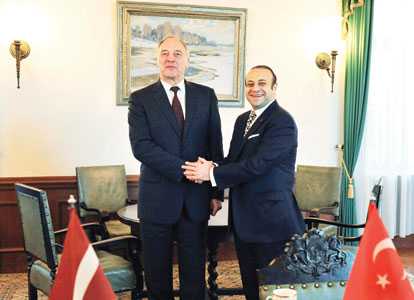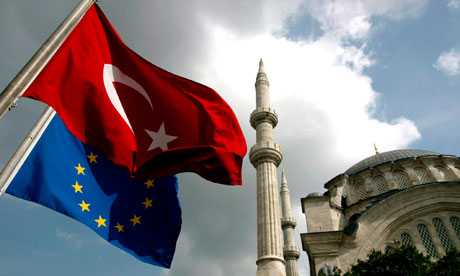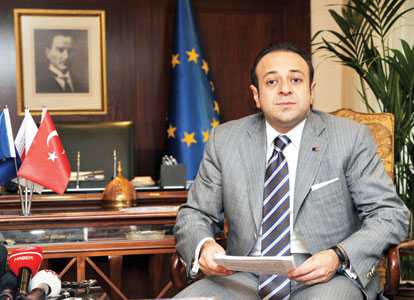By MARC CHAMPION
ISTANBUL—Turkey could get hit hard by the euro zone’s sovereign-debt troubles next year, but will bounce back strongly just as it did after the Lehman crisis, according to the country’s finance minister, Mehmet Simsek.
In an hourlong interview with The Wall Street Journal over the weekend, Mr. Simsek echoed a confidence among Turkish officials that led Europe Minister Egemen Bagis to say last week: “Look out Europe, Turkey is coming to the rescue!”
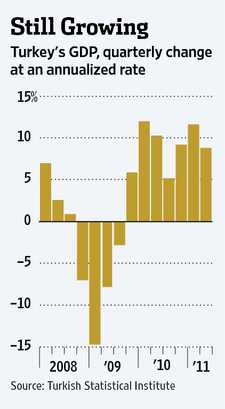 Turkey’s economy is forecast to grow between 7% and 8% this year, after a 9% expansion in 2010, with little sign yet of any rapid slowdown. While Turkey can’t decouple its economy from the European Union, its biggest export market and investor, fiscal headroom and strong fundamentals will allow it to respond, he said.
Turkey’s economy is forecast to grow between 7% and 8% this year, after a 9% expansion in 2010, with little sign yet of any rapid slowdown. While Turkey can’t decouple its economy from the European Union, its biggest export market and investor, fiscal headroom and strong fundamentals will allow it to respond, he said.
“Yes, through trade channels, through other channels our macroeconomic performance may come under pressure,” but Turkey won’t suffer any “permanent damage,” said Mr. Simsek. Fallout from Europe’s debt crisis for the world economy, including Turkey, could be “very significant,” he added.
He contrasted Turkey’s ability to make quick decisions as a single-party government that has its own currency with the euro zone’s need to reconcile 17 different governments, leaving them “behind the curve.”
He said he remains dedicated to Turkey joining the EU, despite its current woes. “Everywhere I go people ask me: ‘Why do you want to join the EU still?,’ ” but that loses sight of what Europe has achieved, he said. The euro, however, was different. “I think in retrospect that the U.K. was probably right” to stay out,” he said. “Unless there is near-perfect cohesion among such diverse nations, then I think it is like a straitjacket.”
During the Lehman crisis, Turkey’s central bank cut interest rates by 10 percentage points to stimulate lending, something euro-zone members couldn’t do. While the economy contracted 4.7% in 2009, it then roared back.
Mr. Simsek in many ways epitomizes a new, more prosperous Turkey that feels able to offer lessons on structural reform and fiscal prudence to richer neighbors in the EU. Turkey is negotiating to join the 27-nation economic and political union, but is being blocked by a number of countries, including France and Germany.
An ethnic Kurd and son of illiterate subsistence farmers, Mr. Simsek grew up in extreme poverty in the mainly Kurdish Batman region of eastern Turkey. At 44 years old, he is finance minister of an economy that has roughly tripled gross domestic product per capita since 2002 and is a member of the Group of 20 industrial and developing nations.
Mr. Simsek ticked off Turkey’s economic highlights: low public debt (42% in 2011, according to the International Monetary Fund estimates, compared to 120% in Italy and 99% in the U.S.); a budget deficit of 1%; a tightly regulated banking sector with average capital ratios above 16%, well above Western banks’; and falling unemployment.
The former Merrill Lynch banker said he recognizes that Turkey, a nation of some 75 million, still has large shortcomings, including in education, labor flexibility and a chronic dependency on energy imports. Nor has the government got everything right, he said. “We would accept that domestic demand has been a lot stronger than we have had ever anticipated,” Mr. Simsek said.
That in turn is boosting Turkey’s current-account deficit, as consumers devour imports and markets for Turkish exports in Europe and the Middle East shrink, leaving the country exposed to a potential funding crunch should external financing for the deficit suddenly pull out.
Economists argue, too, that the government and central bank have been too sanguine about inflation—which hit a year-on-year rate of 7.7% in September, smashing predictions—as they drive to maintain growth. Turkey’s central bank, which currently has a 5.5% inflation target, recently upped its 2011 year-end inflation forecast to 8.3% from 6.9%.
Mr. Simsek said the recent jump was partly due to tax increases. He predicted that headline inflation rates would soon fall and that a market perception that Turkey was running a relatively loose monetary policy was wrong. The central bank in October raised overnight borrowing rates and increased reserve ratios, but controversially, it has kept the bank’s policy rate at a record low of 5.75%.
The finance minister pulled out a presentation contrasting money creation by central banks in Turkey (which is trying to rein in demand), and in the U.S. and Europe (where they are trying to stimulate demand using large doses of quantitative easing). “These are uncharted territories globally…. This is risky stuff to do,” he said, pointing to the loose money policies elsewhere. “But we aren’t doing it.”
—Joe Parkinson contributed to this article.
Write to Marc Champion at [email protected]
via Turkey Confident on Economy – WSJ.com.
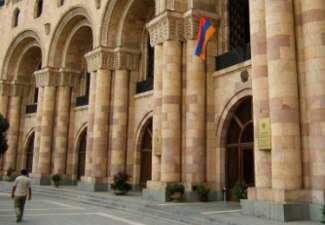 YEREVAN. – Armenian Deputy FM Shavars Kocharyan commented on Turkish Minister for EU Affairs Egemen Bagis’ words that no one can make the Turks to knee in response to Armenian President Serzh Sargsyan’s statement that Turkey, which considers it a European state, will have an administration sooner or later to knee before the Tsitsernakaberd Memorial Complex of the Armenian Genocide.
YEREVAN. – Armenian Deputy FM Shavars Kocharyan commented on Turkish Minister for EU Affairs Egemen Bagis’ words that no one can make the Turks to knee in response to Armenian President Serzh Sargsyan’s statement that Turkey, which considers it a European state, will have an administration sooner or later to knee before the Tsitsernakaberd Memorial Complex of the Armenian Genocide.

